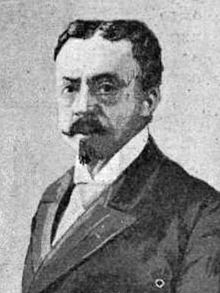Ramón Altarriba y Villanueva
| Ramón Altarriba y Villanueva | |
|---|---|
 |
|
| Born |
Ramón Altarriba y Villanueva 30 August 1841 Bayonne, France |
| Died |
1 April 1906 (aged 64) Madrid, Spain |
| Nationality | Spanish |
| Occupation | landowner |
| Known for | politician |
| Political party | Carlism |
Ramón Altarriba y Villanueva, 1st Count of Altarriba, 24th Baron of Sangarrén (30 August 1841 – 1 April 1906), was a Spanish Carlist politician and soldier.
Ramón Altarriba y Villanueva was born into a distinguished aristocratic Aragonese family of Altarriba, holding baronia de Sangarrén since the 14th century and condado de Robres since the 18th century; its representatives were many times noted in the history of Aragón and Zaragoza. His paternal grandmother, María Bernarda Colón Sierra, was descendant of Christopher Columbus. Ramón’s father, José de Altarriba y Colón de Larreátegui (1804-1870), 11th and 22nd barón de Sangarrén, was a Carlist highly esteemed by Carlos VI; no details of his involvement in the movement are available. Ramón’s mother, also from Aragón, María Pilar Villanueva y Altarriba (1820-1895), was daughter of .
None of the sources consulted clarifies why the family lived in the French Bayonne, a usual location for Carlist exiles and refugees fleeing Spain in the aftermath of defeat suffered during the First Carlist War. Ramón was one of 8 siblings and the second oldest son. His older brother, José María, upon return to Aragón followed the family path and also engaged in Carlist activities, which did not prevent him from becoming comisario regio for Zaragoza in 1869; he inherited all family titles in 1870. Ramón as a youngster moved from France to Spain and entered Real Seminario Científico Industrial, a state-ran and highly esteemedGipuzkoan educational establishment in Bergara. He is reported as enrolled in 1854, though it is not clear when he completed the curriculum; the standard cycle lasted 5 years.
Ramón Altarriba y Villanueva married Rosa Guerra y Serbi; nothing is known of this marriage, apart that his wife died in 1875 and the couple had no issue. He then espoused María de la Blanca Porcel y Guirior (1859-1940), heir to aristocratic family originating from Gipuzkoa and Andalusia. Since her father died in 1873 with no male descendants, having been the oldest daughter she arranged to inherit his titles as 7th and San Millán; Altarriba became marqués consorte. The couple had two sons, Ramón and Jaime Altarriba y Porcel. Nothing is known about the former; the latter (1884–1936) joined artillery and pursued a military career. He became comandante de Artilleria, maestrante de la and an entrepreneur. Also an active Carlist, in 1934 he headed finance section of . The 1936 coup surprised him in the Gipuzkoan spa of Zestoa, where he was detained by the republican militia and died.
...
Wikipedia
